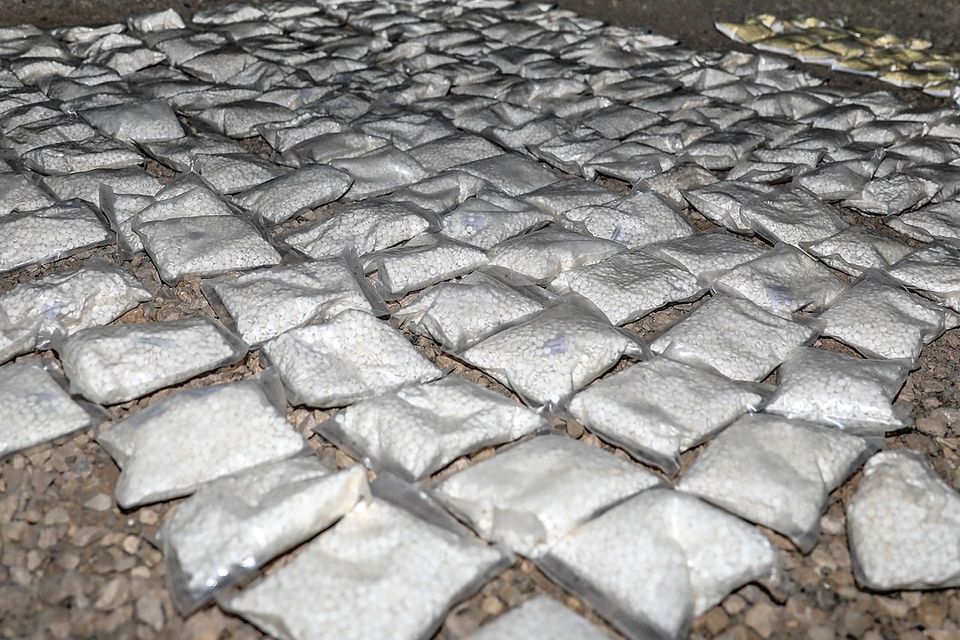
Clashes at the Syrian-Jordanian Border Highlight Need to Address Growing Captagon Trade
In recent months, clashes along the Syrian-Jordanian border have become increasingly common, a result of the growing cross-border trade of captagon. With the recent opening of the Jaber crossing in September, 2021, Jordan is facing the repercussions of one of the Assads government’s most valuable exports. This month, SJAC’s team spoke to civilians on both sides of the Syrian-Jordanian border who are bearing the brunt of this instability. In addition to the effect on local communities, the growing trade has opened a new avenue for the Assad government to secure funding despite international sanctions regimes. States that are imposing those sanctions must dedicate resources to halting the growth of the captagon trade, both to protect local communities and cut the Syrian government off form this valuable source of funding.
The Growth of the Captagon Trade
Captagon is a drug that combines caffeine, amphetamines, and other stimulants and provides users increased energy and a sense of euphoria. The drug is cheap to manufacture and has become popular among young people throughout the Arab world, particularly in the Gulf. In the past, Syria acted as a transit point for pills coming from Lebanon, but now the country’s largely defunct pharmaceutical infrastructure has allowed Syria to become a major manufacturer in its own right. In cooperation with Hezbollah, smugglers can easily move pills across various overland and maritime routes, including the Jaber crossing in Jordan, to Gulf countries where one pill can be worth more than twenty-five dollars. What started as government inability to control these smuggling networks has developed into direct government involvement, with the drug trade becoming a major source of revenue as the government seeks new sources of cash in the face of Western sanctions. Several sources have implicated the Assad government in directly supporting captagon factories and smuggling networks, with the 4th division under the President’s brother, Maher al Assad, supervising production and the smuggling activities at various sites throughout the country.
Smuggling Routes
Almost four years ago, the Jordanian government established a large soil barrier along the border with Al-Suwayda Governorate. The nature of the soil and the depth of the border separator makes tunneling across the border nearly impossible. With these security measures in place, the only remaining points of entry are restricted to Jordan’s northeastern border. Captagon pills manufactured in and transiting through Syria are distributed to dealers residing in Syrian border villages. The role of the dealers is to coordinate with Bedouin smugglers and secure routes so that large shipments of captagon can be transported when visibility is limited by foggy or sandy weather. These operations extend from the Iraqi-Jordanian-Syrian triangle in the east to the governorate of Daraa and are concentrated in a small number of villages.
Increasing Clashes
The effect of the captagon trade on neighboring villages and towns recently received widespread attention after clashes between smugglers and Jordanian authorities that left 27 smugglers dead and eight missing. According to one witness with whom SJAC spoke, clashes between Jordanian government forces and smugglers now occur almost daily. Increasing violence has damaged nearby homes and valuable cropland, stoking fears of displacement by villagers caught up in the violence. Families, mainly in Khirbet Awad, have taken to seeking refuge away from windows and possible stray bullets during cold and foggy weather, when smuggling activity and clashes with border forces become more common.
Unfortunately, young Syrians and Jordanians are often the most impacted by the drug trade, both as addicts and as smugglers. A teacher at a Syrian secondary school reported to SJAC that drug trafficking and abuse among high school and university students and unemployed youth is on the rise, especially in light of deteriorating economic conditions. In Syria, interviewees report that young Syrians are stealing electric cables that contain copper from abandoned houses and selling the scrap to fund their drug addiction. In parallel, a similar statement was received from a social counselor at a school in the Jordanian border city of Ramtha, which has seen the fast spread of captagon due to its cheap price in comparison to other types of drugs.
Recommendations
The international community and particularly states that are sanctioning the Syrian government should act to disrupt these new smuggling networks, both to ensure that the government is not able to secure new sources of revenue and to protect vulnerable communities caught in the middle. While targeted sanctions against those involved in the smuggling networks is a starting point, sanctions alone will not be sufficient to address this problem.
The Captagon Act, a bill recently introduced in the United States House of Representatives, asks the U.S. government to develop a cross-agency strategy to disrupt the captagon trade, including offering support to counter-narcotics efforts in neighboring countries. This request is an important first step, and similar discussions should be taking place in other states invested in the stability of the region. However, states will have to be careful to ensure that support goes to the disruption of smuggling networks, and not the enforcement of harsh punishments against individual captagon users.
Neighboring countries, including Jordan, should also consider utilizing relevant international cooperative mechanisms set out in the International Drug Control Conventions. For instance, the 1971 Narcotics Treaty, which prohibits the export of Schedule II substances (including amphetamine, a component of Captagon) set up a Compliance Monitoring Board. Jordan, or another impacted states, could request the Board to investigate whether Syria is complying with its obligations to not export controlled substances. If Syria did not cooperate with such a request, then Jordan could bring a case before the International Court of Justice.
______________________________________________________
For more information or to provide feedback, please contact SJAC at [email protected] and follow us on Facebook and Twitter. Subscribe to SJAC’s newsletter for updates on our work.